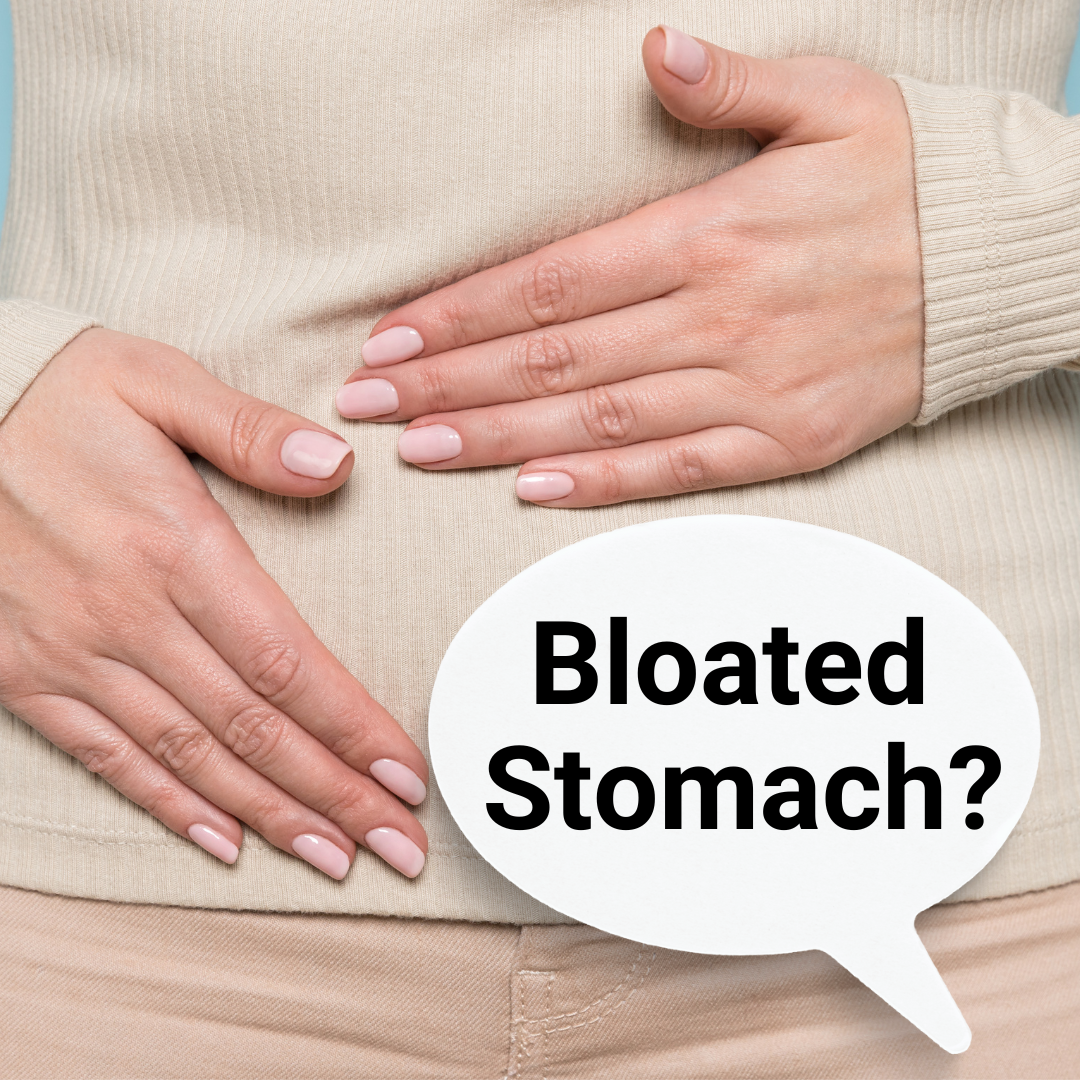Do you know why you’re feeling bloated? Here we go over the typical reasons for a bloated stomach and explain how your hormones could well be the culprit.
A bloated stomach is a common condition that affects many women, characterized by a feeling of fullness or swelling in the abdomen. While often considered a minor nuisance, a bloated stomach can significantly impact quality of life.
Bloated Stomach Causes
Before you can identify the best bloating remedy for you, you ideally need to identify what the cause of your bloated stomach. Sounds obvious, right, but it’s often overlooked as we reach for a quick solution.
So let’s take a look at the most typical causes of bloating, because it’s not just diet related, we’ll delve into hormonal bloating, from pregnancy to menopause bloating.
Typical causes of stomach bloating include:
1. Diet and Food Intolerances
Certain foods and beverages are notorious for stomach bloating. Common culprits include:
– **High-fibre foods**: While essential for digestion, an excessive intake of high-fibre foods such as beans, lentils, broccoli, and whole grains can cause gas and bloating.
– **Dairy products**: Lactose intolerance affects some people, leading to bloating, gas, and diarrhoea when consuming dairy products.
– **Carbonated drinks**: Beverages like soda and beer release carbon dioxide gas, which can build up in the digestive system and cause bloating.
– **Artificial sweeteners**: Sorbitol and other sugar alcohols found in sugar-free products can ferment in the gut, leading to stomach bloating and gas.
2. Overeating
Eating large meals can stretch the stomach and slow down digestion, leading to a feeling of fullness and bloating. Eating too quickly can also cause one to swallow air, which contributes to a bloated stomach.
3. Digestive Disorders
Several gastrointestinal conditions can cause stomach bloating, including:
– Irritable Bowel Syndrome (IBS): A chronic condition characterized by abdominal pain, bloating, and altered bowel habits.
– **Small Intestinal Bacterial Overgrowth (SIBO)**: An increase in the number or type of bacteria in the small intestine, causing gas production and bloating.
– **Celiac Disease**: An autoimmune disorder where ingestion of gluten leads to damage in the small intestine, causing bloating and other digestive issues.
– **Gastroparesis**: A condition where the stomach empties more slowly than normal, leading to bloating, nausea, and vomiting.
4. Constipation
When stool moves slowly through the digestive tract, it can cause a build up of gas and bloating. Lack of fibre, inadequate fluid intake, and sedentary lifestyle are common contributors to constipation.
5. Swallowed Air
Swallowing air, whether from eating too quickly, chewing gum, or smoking, can lead to bloating as the air accumulates in the digestive system.
6. Stress and Anxiety
Stress and anxiety can affect digestion, leading to symptoms such as bloating, gas, and abdominal pain. The gut-brain axis plays a significant role in how emotional and psychological stress can impact gut function.
7. Hormonal Changes
Women may experience bloating during menstrual cycles, pregnancy and experience menopause bloating too due to hormonal fluctuations.
Here we delve deeper into how hormones contribute to a bloated stomach, focusing on the specific hormones involved and the mechanisms through which they affect the digestive system.
Bloating: Key Hormones

1. Estrogen
Estrogen is a primary female sex hormone responsible for the development and regulation of the female reproductive system and secondary sexual characteristics. It fluctuates throughout the menstrual cycle, reaching its peak just before ovulation.
– **Mechanism**: High levels of estrogen can cause water retention, which can lead to a feeling of bloating. Estrogen also influences the gastrointestinal (GI) tract by affecting the motility and transit time of food through the intestines. Increased estrogen levels can slow down bowel movements, leading to constipation and bloating.
– **Menstrual Cycle**: During the follicular phase (the first half of the menstrual cycle), estrogen levels rise, which can contribute to bloating. Additionally, estrogen levels peak just before ovulation, potentially exacerbating bloating and other premenstrual symptoms.
2. Progesterone
Progesterone is another key female sex hormone, which increases after ovulation during the luteal phase of the menstrual cycle. It prepares the body for potential pregnancy by thickening the uterine lining.
– **Mechanism**: Progesterone has a relaxing effect on smooth muscles, including those in the GI tract. This relaxation can slow down gastrointestinal motility, leading to delayed emptying of the stomach and intestines, which in turn can cause bloating, gas, and constipation.
– **Menstrual Cycle**: Progesterone levels rise after ovulation and remain elevated until the onset of menstruation. The peak in progesterone during the luteal phase often corresponds with the worst bloating symptoms in the menstrual cycle.
3. Aldosterone
Aldosterone is a hormone produced by the adrenal glands that helps regulate sodium and potassium levels in the body, as well as fluid balance.
– **Mechanism**: Elevated levels of aldosterone can lead to water and salt retention in the body. This retention increases the volume of fluid in the blood and tissues, contributing to a sensation of bloating and abdominal fullness. Aldosterone levels can be influenced by hormonal changes during the menstrual cycle.
– **Menstrual Cycle**: Aldosterone secretion can increase during the luteal phase of the menstrual cycle, exacerbating fluid retention and a bloated stomach.
4. Cortisol
Cortisol, often referred to as the stress hormone, is produced by the adrenal glands and is released in response to stress. It plays a crucial role in various bodily functions, including metabolism and immune response.
– **Mechanism**: Elevated cortisol levels can lead to increased fat storage in the abdominal area and can influence digestive processes. Chronic stress and elevated cortisol can alter gut motility and permeability, potentially leading to bloating and other digestive issues. Additionally, high cortisol levels can promote the release of aldosterone, further contributing to fluid retention and stomach bloating.
– **Stress Impact**: Stress and anxiety can exacerbate bloating by increasing cortisol levels, leading to changes in gut motility and sensitivity.
5. Insulin
Insulin is a hormone produced by the pancreas that regulates blood glucose levels by facilitating the uptake of glucose into cells for energy or storage.
– **Mechanism**: High levels of insulin, often seen in conditions like insulin resistance and polycystic ovary syndrome (PCOS), can lead to bloating. Insulin resistance can cause the body to retain more sodium, leading to water retention and bloating. Moreover, insulin can influence the gut microbiota, potentially leading to dysbiosis and gastrointestinal symptoms, including bloating.
– **PCOS and Insulin Resistance**: Women with PCOS often experience insulin resistance, which can contribute to bloating and other digestive discomforts.
Pregnancy Bloating
Pregnancy involves significant hormonal changes that can lead to bloating:
– **Progesterone**: During pregnancy, progesterone levels rise substantially to maintain the uterine lining and prevent contractions. This high level of progesterone relaxes smooth muscles throughout the body, including the gastrointestinal tract, which can slow digestion and lead to bloating and constipation.
– **Human Chorionic Gonadotropin (hCG)**: This hormone, produced during pregnancy, can also affect digestion and contribute to early pregnancy bloating.
– **Estrogen**: Estrogen levels also increase during pregnancy, contributing to water retention and a bloated stomach.
– **Relaxin**: This hormone helps relax ligaments and joints to prepare the body for childbirth, but it also relaxes the GI tract, slowing down bowel movements and causing bloating.
Menopause Bloating
Menopause marks the end of a woman’s reproductive years and involves significant hormonal shifts that can contribute to menopause bloating:
– **Estrogen Decline**: During menopause, estrogen levels decline, which can lead to changes in how the body retains water and how the digestive system functions. This hormonal imbalance can cause bloating and other gastrointestinal issues.
– **Progesterone Decline**: Similar to estrogen, progesterone levels also drop during menopause, which can alter gut motility and contribute to bloating and constipation.
– **Increased Cortisol**: Stress levels and cortisol can increase during menopause due to various menopause symptoms, including sleep disturbances and anxiety, further contributing to bloating.
Hormonal Bloating Remedies
Understanding the hormonal causes of bloating can help in managing and mitigating bloating symptoms. Here are some strategies to consider:
1. Dietary Adjustments
– **Balanced Diet**: Consuming a balanced diet rich in fibre, lean proteins, and healthy fats can help regulate digestion. Avoiding known trigger foods like high-sodium foods, artificial sweeteners, and excessive carbohydrates can reduce bloating.
– **Low-FODMAP Diet**: For individuals with IBS, a low-FODMAP diet can help reduce bloating and other gastrointestinal symptoms.
– **Hydration**: Drinking plenty of water helps prevent fluid retention and supports digestion.

2. Regular Physical Activity
– **Exercise**: Regular exercise promotes healthy digestion and reduces fluid retention. Activities like walking, yoga, and stretching can be particularly beneficial for relieving bloating.
3. Stress Management
– **Mindfulness and Meditation**: Practices like mindfulness and meditation can help manage stress levels and reduce cortisol, which can alleviate stress-related bloating.
– **Adequate Sleep**: Ensuring sufficient sleep supports hormonal balance and reduces stress.
4. Hormonal Therapies
– **Birth Control**: For some women, hormonal birth control can help regulate menstrual cycles and reduce bloating associated with hormonal fluctuations.
– **Hormone Replacement Therapy (HRT)**: For women experiencing menopause, HRT can help balance hormones and alleviate symptoms, including bloating.
5. Natural Remedies
– **Herbals**: Peppermint, ginger, and chamomile can help soothe the digestive system and reduce bloating.
– **Probiotics**: Probiotics can help balance gut microbiota and improve digestion, potentially reducing bloating
-**Phytoestrogens**: Plant-based phytoestrogens, such as Red Clover, are believed to mimic the effect of estrogen in the body.
6. Medical Consultation
– **Professional Advice**: For persistent or severe bloating, consulting with a healthcare provider is essential. They can provide personalized recommendations and may suggest treatments like antispasmodics, medications for IBS, or other targeted therapies.
Conclusion
Hormonal fluctuations can be a significant factor in the development of womens bloating. Understanding the role of hormones like estrogen, progesterone, aldosterone, cortisol, and insulin in digestive health is crucial for managing bloating effectively.
By adopting a holistic approach that includes dietary adjustments, regular exercise, stress management, and professional guidance, individuals can mitigate the impact of hormonal bloating and improve their overall well-being.
For womens supplements and herbal remedies shop www.prettypea.blog. The range includes weight loss, hormone balance and menopause supplements, stress and sleep supplements and hacks to increase your daily fibre, protein and fruit & veg intake (the easy way).

References
1. Mayo Clinic. (2021). “Hormonal Causes of Bloating.” Available at: https://www.mayoclinic.org/symptoms/bloating/basics/causes/sym-20050923
2. National Institute of Diabetes and Digestive and Kidney Diseases (NIDDK). (2020). “The Impact of Hormones on Digestive Health.” Available at: https://www.niddk.nih.gov/health-information/digestive-diseases/gas-digestive-tract
3. American College of Obstetricians and Gynecologists (ACOG). (2021). “Hormonal Changes and Digestive Health.” Available at: https://www.acog.org/womens-health/faqs/premenstrual-syndrome-pms
4. National Health Service (NHS). (2021). “Hormonal Bloating During Menstrual Cycle and Pregnancy.” Available at: https://www.nhs.uk/conditions/bloating-and-excess-gas/
5. Cleveland Clinic. (2021). “Managing Hormonal Bloating: Tips and Strategies.” Available at: https://health.clevelandclinic.org/how-to-manage-hormonal-bloating/

